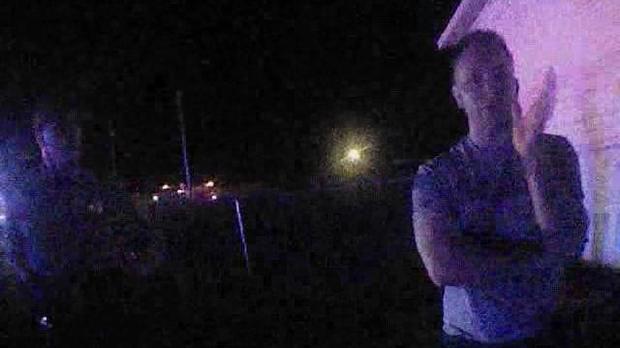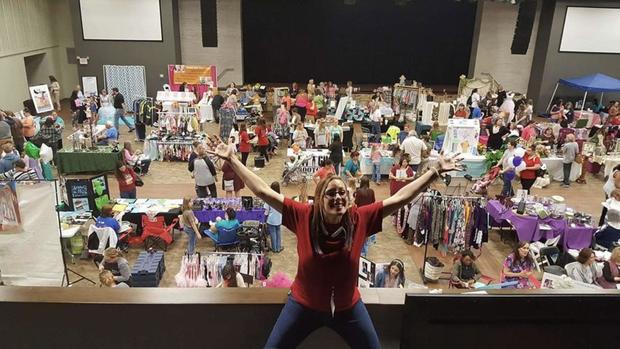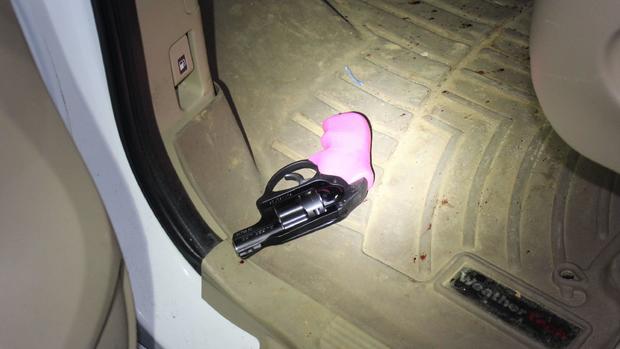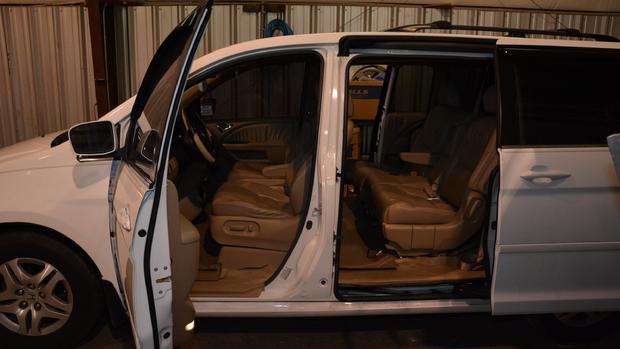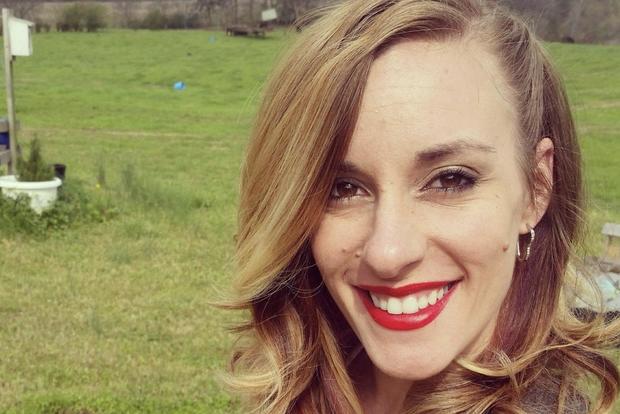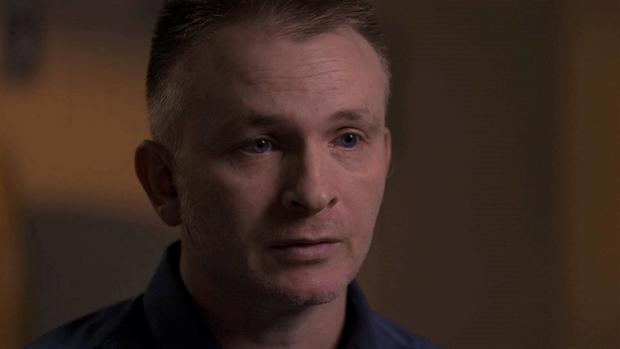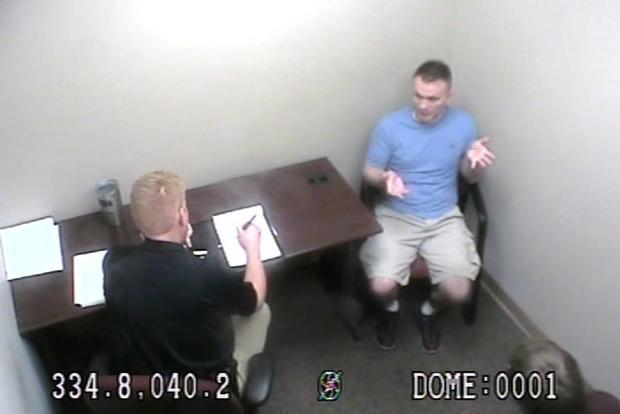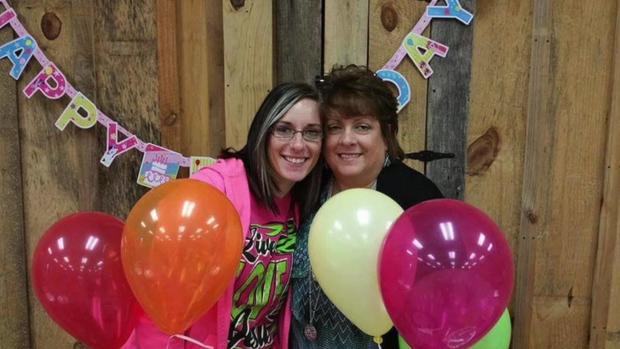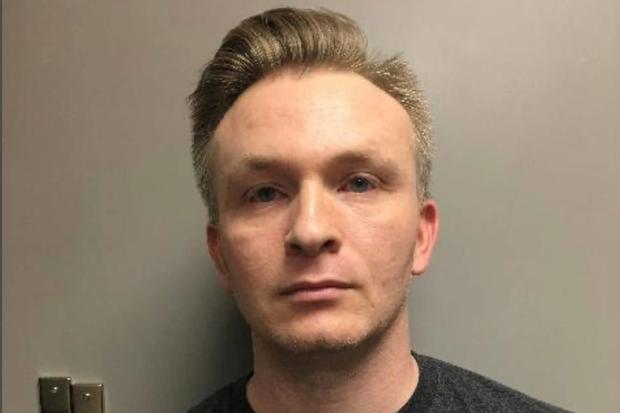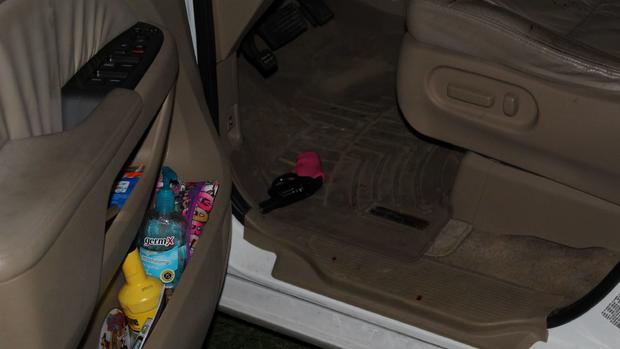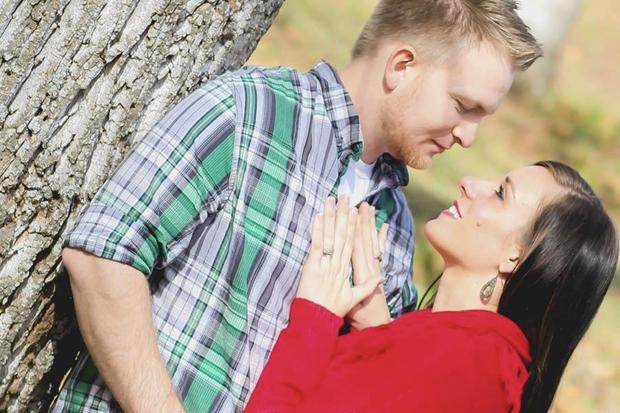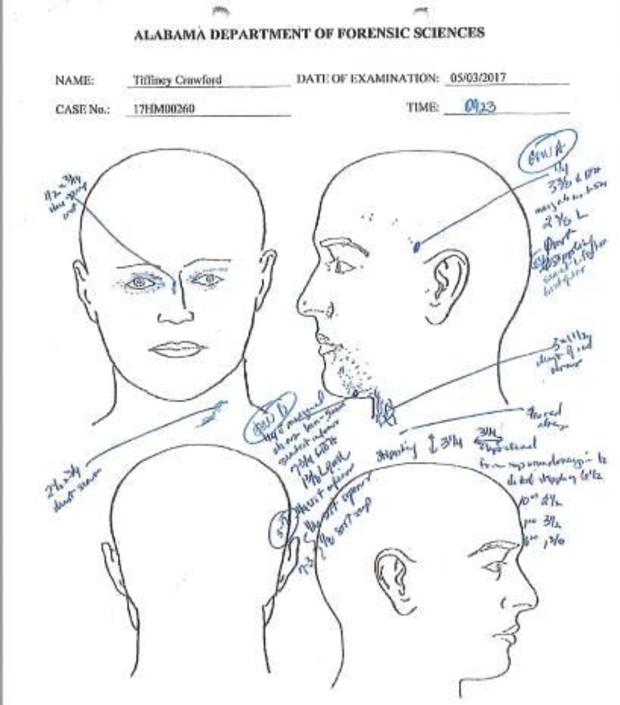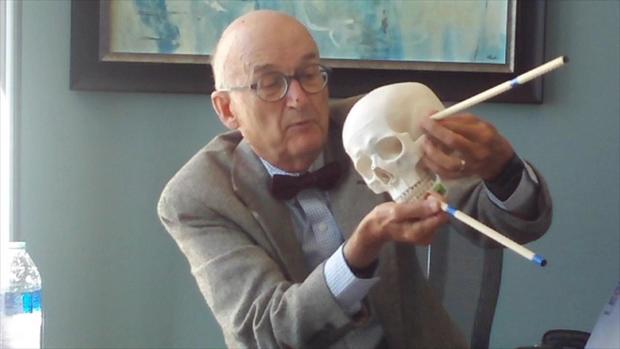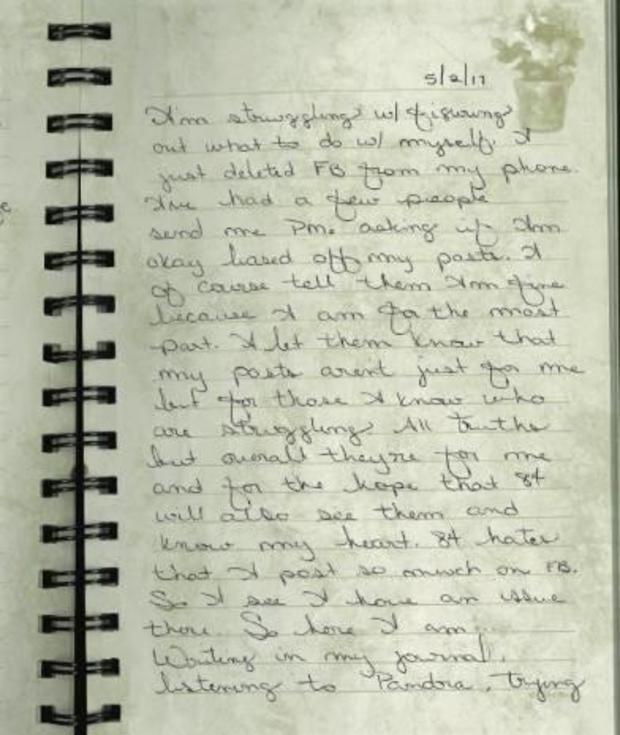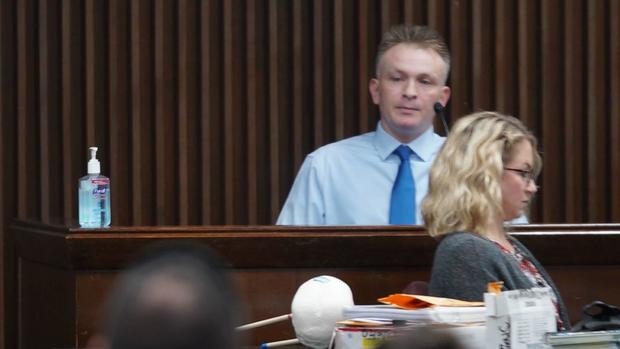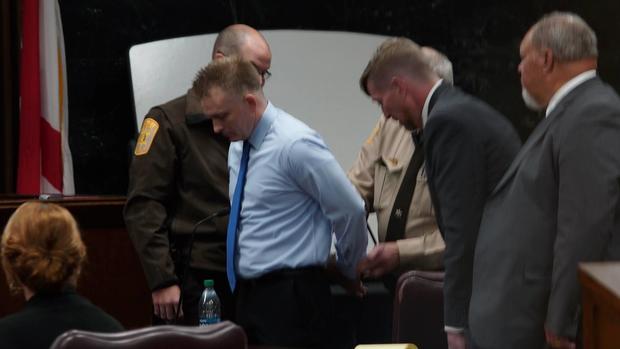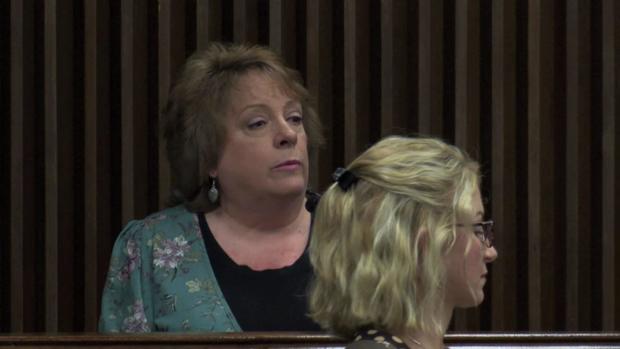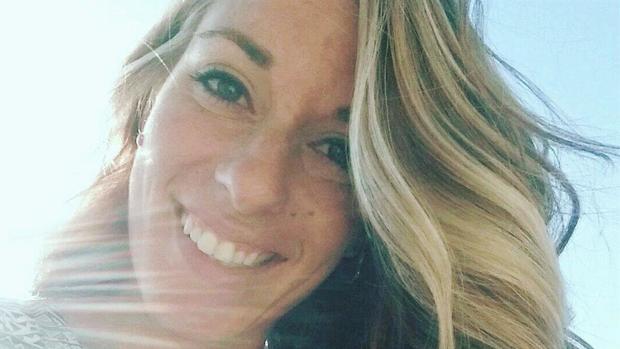Husband's 911 call key in reaching verdict in Alabama mom's murder, says juror
This story originally aired on March 25, 2023. It was updated on Jan, 27, 2024.
It was just after 11 p.m. on May 2, 2017, when then-37-year-old Jason Crawford called 911 from right outside his home in Cullman, Alabama, about 50 miles north of Birmingham.
911 DISPATCHER: 911, where is your emergency?
JASON CRAWFORD: Uh, my wife is shot. I need someone out here, please
911 DISPATCHER: Sir, is she breathing?
JASON CRAWFORD: I don't know … I'm trying to pick her— lift her up so I can see.
Jason remembers that night vividly.
Jason Crawford: It felt like it was taking longer and longer for anybody to get there … And eventually, I saw some headlights.
Body camera footage shows what Cullman County Sheriff's deputies found when they first got to the scene.
DEPUTY: EMS is on their way, OK?
Jason's wife, 32-year-old Tiffiney Crawford, was slumped over in the driver's seat of her own van. There was a pink revolver in her left hand, which Jason says she kept in the driver's side door of her vehicle for protection. When one of the sheriff's deputies tried to check Tiffiney for a pulse, the gun fell out of her hand.
DEPUTY: What happened tonight?
JASON CRAWFORD: Uh, I—We were arguing. … I gave her—her stuff, so she can go. I didn't let her in the house. … And the last thing I remember, she said she loved me, and I was going in the house, and I heard a shot, a scream and then another shot.
Tiffiney had been shot twice in the head. Paramedics tried to revive her —
Jason Crawford: And I was thinking that maybe there's a chance she's still alive.
—but it was too late.
Jason Crawford: And they come over and told me that she was dead … It just made me feel sick in my stomach.
To at least one of the deputies on the scene that night, it appeared pretty clear that this was a suicide.
DEPUTY: There's nothing here so far that says anything to me other than a suicide.
And it wasn't long before deputies realized who Jason Crawford was — the son of Ronda Crawford, who works as an office manager at the sheriff's office.
DEPUTY: You know it's Ronda's daughter-in-law.
Cullman County Sheriff Matt Gentry soon got word.
Sheriff Matt Gentry: The chief deputy called me … and said, 'Hey … it appears that … Ronda's daughter-in-law … had shot herself." ... I said, "I'll go out there and check on them."
By the time the sheriff got there, Ronda Crawford was already on scene. It was Ronda – Jason's mother – who called Tiffiney's mom, Cheryl McGucken to tell her what happened.
Cheryl McGucken: I felt like I was kind of frozen in time in that moment. … And I said, "Is Jason there? Can I talk to him?" And he was already speaking with the police.
Cheryl McGucken: And so, um, I got off the phone and … I tried to figure out what my next step was (cries).
Cheryl's thoughts soon turned to Tiffiney and Jason's children. They shared a 5-year-old son and a 4-year-old daughter. Tiffiney was also stepmom to Jason's then-14-year-old son, Logan. All the kids were inside the house that night; the two youngest were asleep. For Cheryl, life really hasn't been the same since then.
David Begnaud | "48 Hours" contributor: What are the things that you miss about her?
Cheryl McGucken: You know, the things I miss about her is her spontaneity. … Tiffiney was an individual that had a huge heart, and she just wanted to engulf everyone around her and help them find joy.
That is why Cheryl says Tiffiney devoted much of her spare time to a support group that she had started on Facebook called "Mothers Helping Mothers."
TIFFINEY CRAWFORD VIDEO: We're there to laugh with each other, to love each other, and to just build you up in everyday motherhood.
Cheryl McGucken: She saw a vision that there were … other mothers … that needed somebody to talk to … And that group took off like a wildfire and spread all over the country.
Tiffiney and Jason had been married a little more than six years when she died.
David Begnaud: What did you think of Tiffiney when you first met her?
Jason Crawford: I thought she was striking and beautiful. She was outgoing. A lot of things I wasn't, you know? So, it was more of, like, I guess opposites attract kind of thing.
When they started dating, Jason had been divorced for several years. His first wife, he says, had cheated on him. Tiffiney was in a relationship at the time — married, in fact. It wasn't exactly a fairytale beginning from the outside looking in, but Jason says, for the two of them, it was.
Jason Crawford: It was like fireworks from — in the beginning.
Tiffiney eventually got divorced, and that is when she and Jason married and started their family. Just what led up to her death on that night in May 2017 would be up to the investigators to find out. Sheriff Gentry remembers a conversation he had on the scene with the coroner.
Sheriff Matt Gentry: He says, it appears to be a suicide. He said the only weird thing is there's two shots.
David Begnaud: What do you recall about what you thought in that moment?
Sheriff Matt Gentry: Well, that's weird. It's strange. … Now, has that happened before? Yes. But it's not normal.
One of the shots was to her left jaw area, the other was to her left temple.
Sheriff Matt Gentry: I said because of his mother's connection to our office, for transparency, there has to be an autopsy done.
Sheriff Gentry says his investigators went on to process the scene that night.
Sheriff Matt Gentry: We investigate every suicide like a homicide … So, the van was searched. Evidence that was needed to be was seized.
But the next morning, Sheriff Gentry decided to turn the case over to the Alabama State Bureau of Investigation.
Sheriff Matt Gentry: I could have told our guys to work it. … But because of the potential for conflict … I want full transparency.
Joe Parrish is the state agent who got the case.
David Begnaud: What's the first thing you do?
Joe Parrish: I went to the District Attorney's Office … And asked him about the van.
Parrish wanted to get his hands on that van in which Tiffiney was shot so he got a search warrant for it, but there was just one problem: the van had been released to the Crawford family, and by the time Parrish got to it — less than 24 hours after Tiffiney died — it had already been cleaned by Jason's family members. The sheriff's office had given them the go ahead.
Jason Crawford: I didn't want the kids to see anything. I was worried about them when they woke up in the morning.
David Begnaud: What did you make of that, that the van had been cleaned?
Joe Parrish: It was odd that they would clean it up that quick after something like that.
But Sheriff Gentry defends his decision to release the van.
Sheriff Matt Gentry: There was nothing of evidentiary value to the van. … They processed it, took, uh, pictures. They did everything they normally would do on a crime scene, uh, that night.
David Begnaud: Right. But if you're treating it like a homicide, I'm not turning the van over to the family.
Sheriff Matt Gentry: Sure. So — so and I — I mean, I completely understand. So, it was treated — we worked it like a homicide, but it was treated like a suicide. … Every bit of evidence that was needed was taken.
But as it turns out, that van would be significant. And so would what Jason and Tiffiney were arguing about right before she died.
THE AFFAIR
Jason Crawford says that in the months leading up to his wife Tiffiney's death, he noticed a change in her.
Jason Crawford: Yeah— I could tell something was going on because she was getting more distant…
Jason Crawford: She had been drinking a lot … too … two or three bottles a week sometimes.
David Begnaud: So, you had a feeling something was up?
Jason Crawford: Yes.
And he says his suspicions were confirmed the night Tiffiney died. Just hours before she got home, Jason found messages on their computer suggesting that she was having an affair.
Jason Crawford: I started calling her, you know, just trying to see if she would tell me anything. And… She's like … I don't know what you're talking about, denying it. And I was like, "OK, well, I think you need to get home."
Tiffiney's mom, Cheryl, says she knew about the affair.
Cheryl McGucken: She called to let me know she was on her way home. And that, um, Jason and her were going to have to have a discussion about their problems …
David Begnaud: Did she sound worried?
Cheryl McGucken: She did not sound worried. She sounded kind of hyper and, you know, anxious. … I just said, "Well, I love you. Be careful."
Tiffiney's friend, Lyndsy Luke, says she also knew about the affair. Lyndsy says Tiffiney told her she was making plans to leave Jason, and that she got a job at a local grocery store to save up money for a new life on her own.
Lyndsy Luke: She knew what she needed to leave him and how she was so close.
David Begnaud: Was Tiffiney afraid that Jason was going to find out about the affair?
Lyndsy Luke: Yes. And she didn't want him to because she didn't want to hurt him.
But that night, when he did find out, Jason says he was hurt and angry. This was the second time a wife had cheated on him. When Tiffiney got home, he says that's when he confronted her, and refused to let her go inside.
Jason Crawford: I kept telling her she's not staying the night. … She asked me, "why can't I stay?" I was like … "you've destroyed the sanctity of our marriage."
David Begnaud: You were really angry.
Jason Crawford: Uh, yeah, I was angry, but I was controlled anger.
Jason claims they argued for more than an hour, and when he remained insistent that Tiffiney was not going inside, he says she asked him to go and get her work clothes.
Jason Crawford: I went in and grabbed some clothes and threw them to her. And then … I told her I'm done talking. Um, so, I went in the house. And as soon as I went in the house … I heard a shot, her scream, and then another shot.
David Begnaud: And then you did what?
Jason Crawford: Went right back outside.
David Begnaud: And what position was the door in — the car door?
Jason Crawford: The car door. It was pulled to or closed.
Jason says that's when he called 911. But in that call and the police body camera footage from that night, Jason never mentioned an affair.
JASON CRAWFORD (dash cam video): Last thing I remember, she said she loved me ...
Lead investigator Joe Parrish says authorities didn't learn about the affair until the next day. Also, when Parrish listened back to that 911 call, there was more that caught his ear.
Joe Parrish: It was very cold … It didn't sound like somebody that was worried about his wife.
911 DISPATCHER: I'm gonna need some more information from you ...
And there was one question that the 911 dispatcher kept asking Jason that he wouldn't answer.
911 DISPATCHER: Who shot her in the head?
Joe Parrish: Who shot your wife? … He was avoiding the question.
David Begnaud: I would like to play the 911 call for you.
Jason Crawford: OK.
911 DISPATCHER: 911, EMS and Fire, where is your emergency?
JASON CRAWFORD: Uh, my wife is shot.
David Begnaud: You seem cool as a cucumber.
Jason Crawford: Well, maybe that's just the way my tone of voice is.
911 DISPATCHER: She's been shot? Who's she been shot by?
JASON CRAWFORD: Please send an ambulance now, please.
David Begnaud: She asked you who's she been shot by. And you didn't respond. Why not?
Jason Crawford: Yeah. I just felt like if I said it into existence, it'd be true.
JASON CRAWFORD: She's been shot in the head.
911 DISPATCHER: Did she shoot herself in the head?
David Begnaud: This lady gave you an opportunity to say yes.
Jason Crawford: Yeah.
David Begnaud: And you didn't respond?
Jason Crawford: Well, I don't know how many more times I can tell you. … I just froze in thought.
David Begnaud: Do you understand how somebody listens to that and says, yeah, 'cause he did it?
Jason Crawford: Yeah. I can understand that.
And that's exactly what Joe Parrish thought. A week after Tiffiney died, and with her autopsy results still pending, Parrish decided to bring Jason in for questioning.
During that interview, Jason spoke in detail about discovering the affair and the argument that he had with Tiffiney:
JASON CRAWFORD: I said, "You've ruined our home." I was like, "You're no longer a part of this ..."
And he also answered a question that Parrish believed was key:
AGENT JOE PARRISH: Was she left or right-handed?
JASON CRAWFORD: She's right-handed.
AGENT JOE PARRISH: Right-handed.
JASON CRAWFORD: Yeah.
Tiffiney was right-handed, but the gun had been found in her left hand.
David Begnaud: How often, in your experience, do suicides happen where the individual uses their non-dominant hand?
Joe Parrish: I've never seen it personally.
Jason Crawford: It's not like I know she's like so predominantly right-handed that she couldn't use her left hand.
But why would Tiffiney, a woman who devoted so much time to helping others, suddenly kill herself?
Lyndsy Luke: There was nothing suicidal about her.
Even Jason finds it hard to explain.
David Begnaud: Had she ever spoke about wanting to kill herself?
Jason Crawford: Not that I know. Not to me.
After Parrish interviewed Jason, he was free to go. But about a week later, he was brought back in for questioning —- this time by Parrish's colleague. Jason agreed to take a polygraph, and investigators told him he failed.
POLYGRAPH EXAMINER: Your reactions were off the chain. OK? … You're saying that there's no way that you shot your wife?
JASON CRAWFORD: Correct.
It wasn't long before things turned contentious.
INVESTIGATOR: I don't want to hear that — that, "I didn't shoot my wife ..." … Because I know that's a f****** lie.
JASON CRAWFORD: I can get up and leave because I'm not under arrest, right?
INVESTIGATOR: Huh! You listen to me, huh! … (Jason walks out the door) Walk out that f****** door.
That interview also ended with no arrest. Because of a backlog, it would take nearly a year to get the missing piece of the puzzle: those autopsy results. You see, the manner of death was ruled a homicide, and that is when the decision was made to present the case to a grand jury. Jeff Roberts was the Cullman County Assistant District Attorney at the time.
Jeff Roberts: I have no doubt in my mind he's guilty at all. … I think the forensics tipped the case.
But would a grand jury indict Jason? Even Tiffiney's mother had her doubts.
Cheryl McGucken: Even though I didn't want to believe it was a suicide, naturally, I wouldn't want to believe my son-in-law killed her either.
TIFFINEY'S DEATH RULED A HOMICIDE
Cheryl McGucken: It's a sad situation, whether on one side you believe somebody committed suicide or somebody committed murder. … Neither one of those scenarios work in my mind.
In the year following her daughter Tiffiney's death, Cheryl McGucken says she had a hard time believing that her daughter could have killed herself — but she also couldn't imagine that her son-in-law, Jason, would've pulled the trigger.
David Begnaud: Did you ever call the investigators and say, I want to know every bit of details you have? I want to know all the details.
Cheryl McGucken: No.
David Begnaud: Why not?
Cheryl McGucken: I suppose I didn't want to, um, let that cloud, my time with my grandkids and my relationship with Jason and his family —
Jason Crawford: My family and friends … they never questioned that I wouldn't kill my wife.
Jason did have a lot of support, but not from the investigators or then-Cullman County Assistant District Attorney Jeff Roberts and his legal assistant Debra Ball.
Debra Ball: She was too out there to help other people. … She's not gonna kill herself.
Jeff Roberts: There's no way that that's what happened.
Once Roberts had received word that the medical examiner had ruled Tiffiney's death a homicide, he decided, along with lead investigator Joe Parrish, to seek an indictment against Jason.
Jeff Roberts: I couldn't figure out who else did it. He's the only one who had a motive to do it, for one thing.
Agent Joe Parrish: The grand jury came back with an indictment for murder for Jason Crawford.
Cheryl McGucken: Jason called me and told me. … It was very shocking. And very confusing.
On May 21, 2018, just over a year after Tiffiney died, Jason surrendered.
Joe Parrish: Walked in, I told him he was under arrest. He didn't seem to be worried.
David Begnaud: He didn't seem to be worried?
Joe Parrish: No.
Jason wasn't in custody for very long. In fact, he was released on bond and Robert Tuten and Nickolas Heatherly became his defense attorneys.
Robert Tuten: We don't believe Jason is guilty of this at all. … There's no evidence … They did not see blood or anything on him. They found nothing that would indicate he had, had fired a, a firearm recently.
But the night of the shooting Jason was never tested for gunshot residue, and his house was never searched for bloody clothing. Still, Tuten and Heatherly say they believe Jason, who says he was inside the house when the gunshots rang out.
Robert Tuten: His oldest son … heard his father come back in the house right before the first gunshot.
And about that polygraph test that Jason was said to have failed?
Robert Tuten: Police investigators use those as an investigative tool. If they think somebody is guilty, they tell them that they have failed the polygraph and insist they tell / what really happened.
David Begnaud: They gave you a lie detector test and you failed it.
Jason Crawford: Hmm, yeah. … They can make those read how they want to.
Jason's defense team also downplayed that 911 call — the one in which Investigator Parrish noticed Jason sounded calm, even evasive.
Robert Tuten: If someone's never been in a high-pressure situation like that where they've just been shocked by what they're seeing, they probably would not understand how that affects somebody.
Jason Crawford: It just felt like I was outside my body not knowing what was going on.
But the prosecution was confident that Jason was guilty. Dr. Valerie Green was confident, too. She is the medical examiner who conducted Tiffiney's autopsy.
David Begnaud: Do you remember saying … to yourself … "I got a feeling there's more to this story"?
Dr. Valerie Green: Oh, yes, definitely. … I think the thing that made me think that there could be something else going on with this case is … that gunshot wound on the left side of Ms. Crawford's head.
Dr. Green says that based on the absence of gunpowder particles and abrasion around the wound to Tiffiney's left temple, she concluded that the shot had to have been fired from at least 10 inches away.
Dr. Valerie Green: That's indicating that, you know, she's holding her arm outward beyond 10 inches and trying to shoot herself. … not saying … that it's impossible. But it's not likely.
It is especially unlikely, says Dr. Green, because Jason reported that he found Tiffiney in the driver's seat of her own van with the gun in her left hand and the car door closed.
DEPUTY: Where's the gun, sir?
JASON CRAWFORD: It's right here in her hand.
Dr. Valerie Green: That was concerning to me because I mean … For you to be able to hold up a gun and shoot yourself in the head … it would be difficult to do, and that's such a small space.
That's not all, says Dr Green. Neither of Tiffiney's injuries were contact wounds.
David Begnaud: She didn't have a contact wound here and she didn't have a contact wound here.
Jason Crawford: Correct.
David Begnaud: Most suicides involve the barrel, or the tip of the gun being placed on the skin.
Jason Crawford: Yeah. And you said most, not all.
But there was something else Dr. Green noticed, specifically about that van.
Dr. Valerie Green: I remember looking at pictures of the driver's side door … And I didn't see any blood on that door. I didn't see any blood on the glass or the window. I didn't see anything even low on the door. … That makes me think that the door was not closed. … And I think that that door is open because he was standing there.
Despite the autopsy report, and the fact that a grand jury had indicted Jason, Tiffiney's mom continued to support him.
Cheryl McGucken: I never changed how I felt towards Jason. I mean, what purpose would that serve? You know, he's also somebody's child. And he's the remaining parent to my grandchildren.
More than four years would pass before the case ever went to trial. During that time, the defense would retain their own medical examiner—the former chief medical examiner for the state of Alabama — and he had a drastically different opinion than Dr. Green.
Dr. James Lauridson: I believe it's a suicide.
THE TRIAL OF JASON CRAWFORD
In November 2022, more than five years after Tiffiney Crawford died, her husband, Jason Crawford, went on trial for her murder. Prosecutor Jeff Roberts was confident in his case, but he knew there would be challenges.
Jeff Roberts: The fact that … it was considered by the officers on the scene apparently consistent with suicide, I thought this is going to be really tough to overcome.
Jason's defense attorneys Robert Tuten and Nickolas Heatherly also felt that they had their work cut out for them.
Robert Tuten: Simply because there's no way to really find a definitive answer for exactly what happened.
"48 Hours" was only allowed to film the trial from outside the courtroom, through a windowed door. Tiffiney's mother, Cheryl, who said she didn't want to hear the details surrounding her daughter's death, chose not to attend the trial.
Cheryl McGucken: I knew that there would be things said on both sides that I … didn't want to have in my head.
But she did go on day one—solely to testify. She was the prosecutor's first witness.
Cheryl McGucken: He assumed that I was on their side
Instead, Cheryl says she told the jury how she really felt about Jason.
CHERYL MCGUCKEN: I've never had any issues with Jason.
Megan Brock was a juror on the case.
Megan Brock: She was telling everybody, me and Jason have a great relationship. … I was, like, "really?"
David Begnaud: You thought it was weird that his mother-in-law—might still be supporting him—as he's on trial for murder?
Megan Brock: Mm-hmm. Yup.
Undeterred, the prosecution moved on with what they felt was evidence of Jason's alleged motive: anger over his wife's affair. A friend of Tiffiney's testified that Jason called her after learning that Tiffiney had been cheating on him, and that he said, "He couldn't go through this again," referencing the fact that his first wife had also had an affair. Jason claims he didn't say that.
David Begnaud: His first wife cheated on him. Tiffiney cheated on him. Isn't it plausible for somebody on the jury to think, hey, look, the guy snapped … so he killed her.
Robert Tuten: I don't think that happened at all. He didn't snap over his first wife. … They remained friends even to this day.
Jason's 911 call was also played for the jury, and they saw some of that police body camera footage, too.
The prosecution also called DNA analyst Angela Fletcher, who examined swabs taken from Tiffiney's gun. She testified she couldn't say for sure whether there was any female DNA on the gun because there was only a trace amount of DNA detected. But she was certain that both the grip and the trigger contained male DNA.
David Begnaud: Is it Jason Crawford?
Angela Fletcher: No. The profile was so limited that I was unable to do any type of comparisons.
Jason Crawford: There are other people that have touched that gun that were males. My dad gave her the gun, so his DNA may be on it. … Her brother also shot it.
With so little DNA detected, the prosecution argued that Jason must have wiped the gun and then planted it in Tiffiney's hand.
Robert Tuten: There's no proof. There's no evidence of it at all, no.
Jeff Roberts: Her DNA would have had to be on that gun if she did it herself.
But perhaps the most damaging testimony against Jason came from Medical Examiner Dr. Valerie Green. She told the jury how she believes the gunshot wound to Tiffiney's temple was fired from more than 10 inches away.
Jeff Roberts: Which is way more consistent with him standing outside the car, shooting her than … her trying to hold a gun, you know, over 10 inches away.
But the defense showed the jury a pre-recorded deposition with their own medical examiner, Dr. James Lauridson.
DR. JAMES LAURIDSON: I believe that — that Mrs. Crawford shot herself first in the left side of the face and then shot herself in the left side of the head.
Dr. Lauridson also testified there is no way to tell how far away the gun was when that shot to Tiffiney's temple was fired — because her hair was in the way.
Dr. Valerie Green: I do realize that scalp hair can filter out gunpowder particles … but that was taken into consideration. … I would expect more abrasions to have been able to filter though her hair.
The defense also argued that Tiffiney had been struggling emotionally. She had started seeing a counselor just one day before she died. And friends of Tiffiney testified that she had been drinking excessively, and that she was upset because the man with whom she was having an affair had recently broken up with her.
Robert Tuten: He told her he didn't want to have anything else to do with her.
Robert Tuten: Basically, her whole life is falling apart, and I think she just gave up.
Tiffiney's journal was also entered into evidence. And in an entry dated the day she died, she wrote that she was "…struggling with figuring out what to do with herself" and that she was "… trying to avoid breaking down."
David Begnaud: Isn't it possible that she was having thoughts of suicide?
Jeff Roberts: I would say no. … She had started seeing a counselor. That's somebody who was looking forward in life.
Jason's son, Logan, also took the stand for the defense. He testified that he heard his father inside the house when the gunshots went off that night. But the prosecution questions his memory.
Jeff Roberts: When he keeps hearing the same story, his stories will start matching up somewhat like all 14-year-olds would.
Nickolas Heatherly: His story never changed. He was interviewed by law enforcement, and it stayed consistent.
As the trial was drawing to a close, the defense made a bold decision. They called Jason to the stand. He testified that he loved Tiffiney and denied killing her, but both the prosecution and the defense acknowledge there was a point where he lost his cool.
Robert Tuten: He argued a little bit with the prosecutor.
Jeff Roberts: The person on the stand was the person that you could easily see doing this.
Jason also testified that he called Tiffiney a degrading name that night she died.
David Begnaud: You said to the jury, I was trying as best I could to make her hurt inside as much as I was hurting.
Jason Crawford: Mm-hmm. Yeah. … I was just basically talking down to her … like she was not human. … I feel sorry … because I feel like maybe that contributed to what pushed her to — over the edge to do that.
Even though Jason's testimony likely did him no favors, there was still no direct physical evidence pointing towards his guilt.
Robert Tuten: There's no evidence that Jason fired the gun.
And after four days of testimony, the case went to the jury.
Megan Brock: I said, "Oh, God, here we go. … I don't know if this man did it or not."
HOW THE JURY REACHED A VERDICT
It was Nov. 18, 2022, and Jason Crawford's fate was now in the hands of a jury. Behind closed doors, Megan Brock says she and several fellow jurors were on the fence about his guilt.
Megan Brock: And I was, like, "So, we're gonna sit here for the next, however long it takes?"
Cheryl McGucken: My stomach was in knots.
Cheryl McGucken admits she was nervous for Jason and his family.
Cheryl McGucken: You know, this is my son-in-law.
After several hours deliberating, the jury requested access to that body camera footage. Then they asked for the 911 recording.
JASON CRAWFORD (to 911): ...My wife is shot. I need someone out here, please.
About 30 minutes later, they announced they had reached a decision. Cheryl was in the courtroom, only for the second time.
David Begnaud: And who were you with for the verdict?
Cheryl McGucken: I was sitting with my husband right behind Jason's parents and the rest of his family.
As for the verdict, this is how Megan says the jury came to their decision.
Megan Brock: When we listened to that 911 call again, that was it.
David Begnaud: So, the 911 call sealed the deal?
Megan Brock: That was it.
David Begnaud: Really.
Megan Brock: The … operator, she keeps asking him, you know, "who shot her?" Finally, she was, like, OK, well, where is the gun at? And he said, laying beside her. … And we were like, like, wait what?
911 DISPATCHER: Where is the gun at?
JASON CRAWFORD: It's laying beside her.
Megan Brock: He clearly said "the gun is laying beside her" … When in fact, the body cam footages showed her holding the gun, barely, but holding the gun.
David Begnaud: The gun wasn't laying beside her.
Jason Crawford: It was beside her because it's on her side, in her hand.
David Begnaud: They found the gun in her hand?
Jason Crawford: Yes.
David Begnaud: You understand the difference between in her hand and laying beside her?
Jason Crawford: To some people, yes. Like, beside her, it's beside. Like laying on her — it's beside her. … I just chose the wrong words to say.
But the jury did not see it that way.
Megan Brock: I said, "Oh f***. He's guilty." Everybody said the same thing. They were like, "he's guilty."
David Begnaud: The verdict was guilty.
Jason Crawford: Yes. … It just felt like it shouldn't be happening … it was unbelievable. So, I was just stunned.
Cheryl McGucken: You know, I had a friend that said … "hallelujah." And that really bothered me. Because that wasn't anything to cheer about. … There's no justice here. Everybody loses.
David Begnaud: You are a grandmother.
Cheryl McGucken: Mm-Hmm.
David Begnaud: And there are two kids left behind who had nothing to do with this.
Cheryl McGucken: Right. Exactly.
David Begnaud: But at the end of the day, this man was put on trial.
Cheryl McGucken: Mm-hmm.
David Begnaud: The evidence was heard.
Cheryl McGucken: Mm-hmm.
David Begnaud: He was convicted.
Cheryl McGucken: Mm-hmm.
David Begnaud: So, he is a killer in the eyes of the law.
Cheryl McGucken: You know, they're going to do an appeal. I don't want to misspeak on this at all.
David Begnaud: But when you say they're doing the appeal, what do you mean? Are you protecting him?
Cheryl McGucken: I — I don't have any reason to protect him, um, but I'm going to let things play out as they will.
Following this interview, Begnaud asked Cheryl if she had any interest in seeing the evidence.
David Begnaud: You said you did. You asked if we could show it to you. We provided you with what was in the public record.
Cheryl McGucken: Yeah.
David Begnaud: What do you now believe?
Cheryl McGucken: Well, I now believe that he did kill her.
Cheryl McGucken: Reading the evidence, going through what was said during the trial. It — it — it made it painfully obvious.
On March 10, 2023, Cheryl McGucken took the stand again at Jason's sentencing hearing. But this time, she spoke for her daughter.
CHERYL MCGUCKEN (reading): I couldn't understand how my son-in-law, Jason, could look me in the eye for five-and-a-half years, if he had murdered my daughter.
"48 Hours"' cameras were again outside the courtroom looking in, so Cheryl shared with us, what she said directly to Jason.
CHERYL MCGUCKEN (reading): Jason, if not you, who? You were there. You know the truth. … I pray you will someday find wisdom and strength to speak the truth.
She said that in front of her grandchildren, too — they were sitting in the very front row. Cheryl didn't know that Jason's parents were going to bring them.
As the judge prepared to sentence Jason Crawford, his lawyers were still pleading his innocence, just as Jason did when Begnaud first spoke with him.
David Begnaud: If I could interview Tiffiney today, what do you think she'd tell me?
Jason Crawford: Probably that she's sorry. She's — didn't realize that it would affect so many people like — like it did.
David Begnaud: She wouldn't tell me that you're a liar and a killer?
Jason Crawford: No. I don't think so.
Jason was sentenced to 99 years in prison. But under Alabama law, he will be eligible for parole in 15 years.
David Begnaud: What do you think Tiffiney would say now, having seen you on the stand?
Cheryl McGucken: I can hear her saying, "I'm proud of you, Mama."
Now, Cheryl just wants to make sure that her grandchildren are proud of their mother, and never forget who Tiffiney was and what she stood for.
Cheryl McGucken: She was just an angel that came down from heaven for a short time to teach all of us … how to love and be kind and be giving.
Jason Crawford's appeal was denied by the Alabama Court of Criminal Appeals.
Produced by Stephanie Slifer and Judy Rybak. Gabriella Demirdjian is the field producer. Ryan Smith is the development producer. Liz Caholo is the associate producer. Jud Johnston, Wini Dini and George Baluzy are the editors. Peter Schweitzer is the senior producer. Nancy Kramer is the executive story editor. Judy Tygard is the executive producer.
